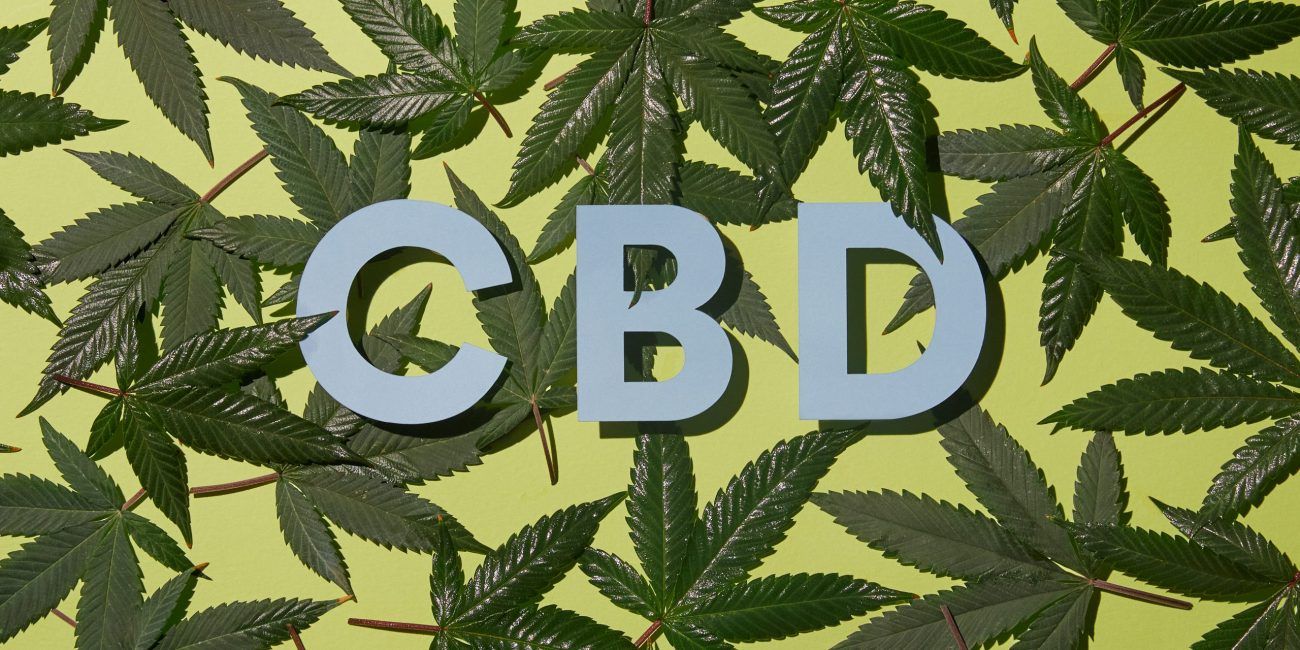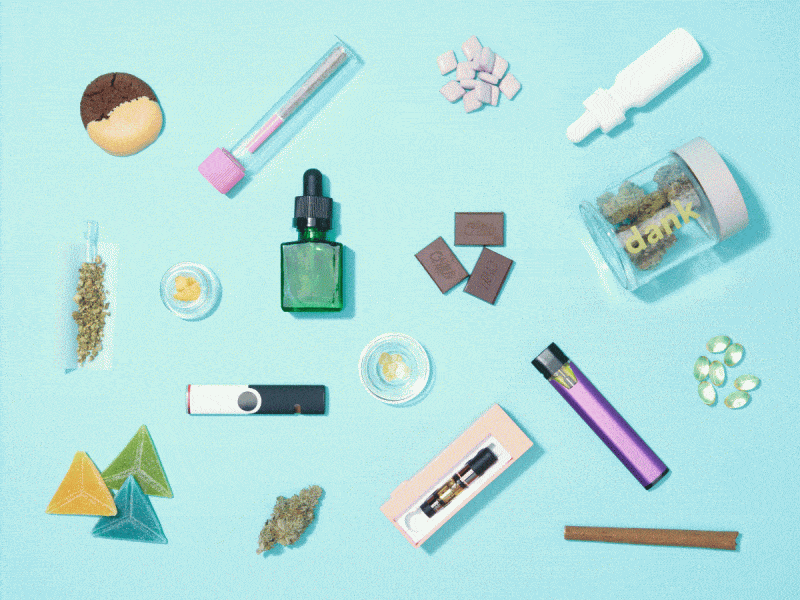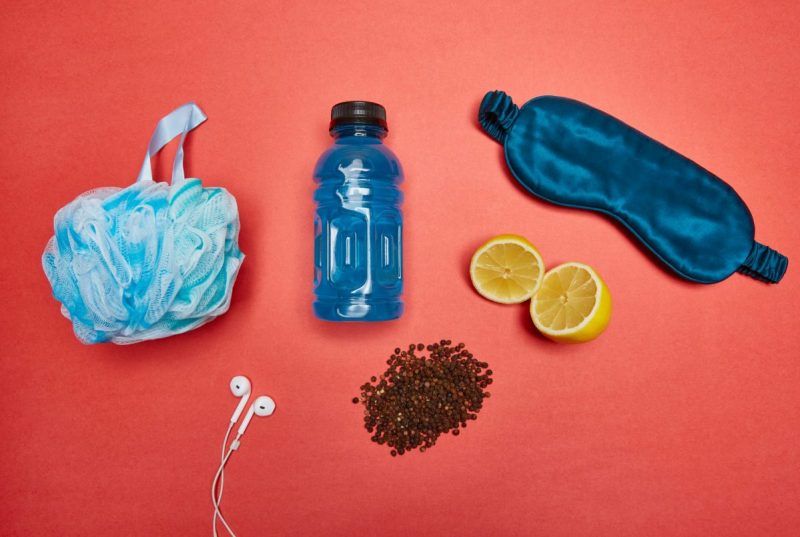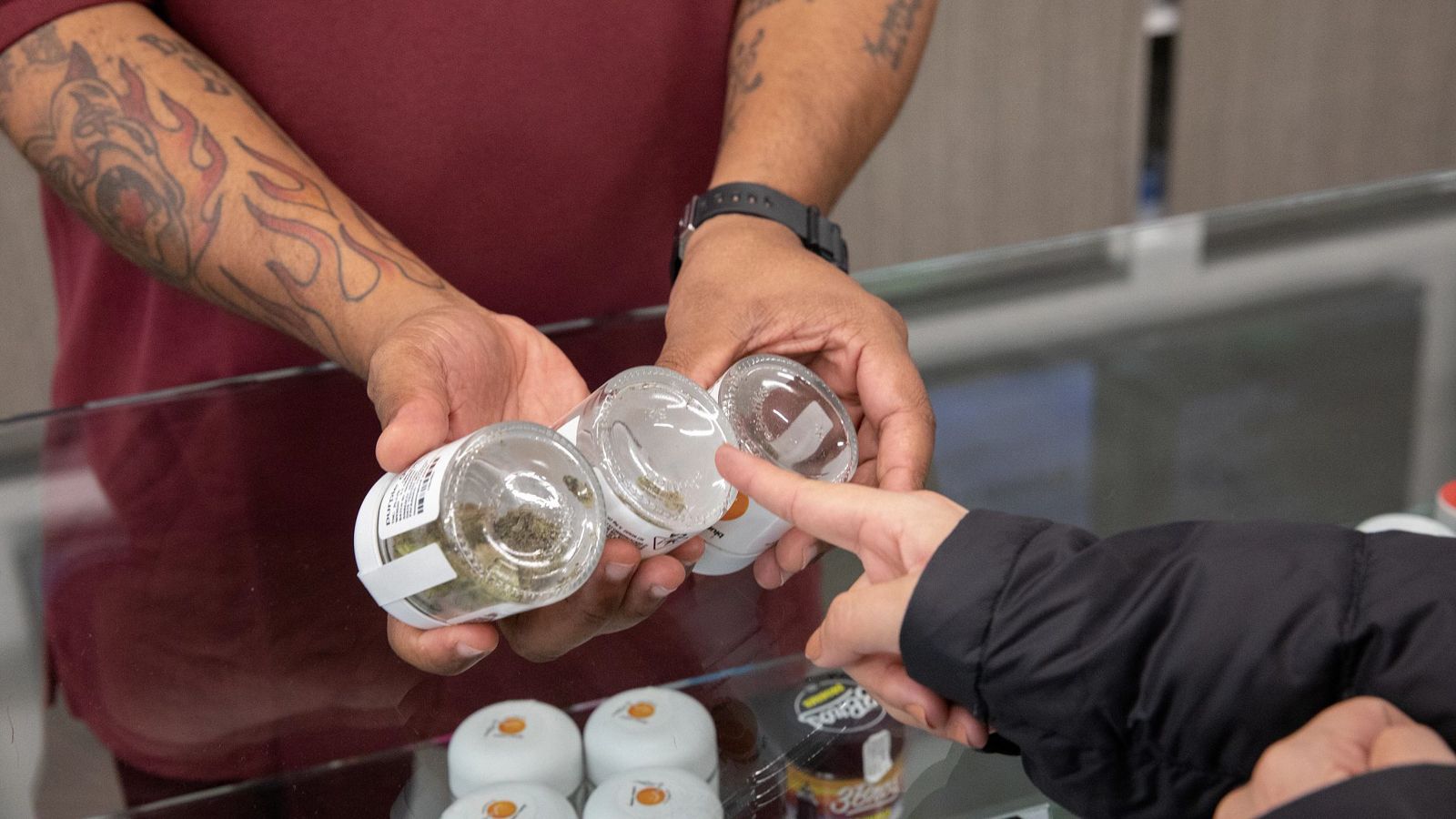Fat Freddy
Well-Known Member
Does CBD really counteract the effects of THC?
Lorena Cupcake ∙ April 21, 2022 11:12 am PDT | Updated 1 month ago
Lorena Cupcake, voted “best budtender in Chicago," has answered hundreds of questions from cannabis shoppers and patients during their time as a budtender. And now they're turning that experience into a monthly advice column, Ask a budtender. Got a question for Cupcake? Submit it to askabudtender@weedmaps.com.
Dear Cupcake,
I know that CBD blocks THC from binding with CB1 receptors. I've even heard that if you accidentally get too high, CBD can help sober you up.
Does that mean products with CBD in them get you less high than the same product with no CBD? I don't want to waste my money on less effective products.
— High Guy
How cannabinoid receptors influence THC
CB1 receptors, an essential part of the body's endocannabinoid system, are found primarily throughout the brain and nervous system. THC binding to these receptors is the miracle of nature that causes us to feel high.Besides THC, over one hundred cannabinoids have been identified. Some of them are known to influence how effectively THC can bind to CB1 receptors. For example, the non-intoxicating trace cannabinoid THCV is a competitive antagonist, which means it physically blocks access to the receptor, like the goalie on an opposing hockey team.
CBD, the primary cannabinoid found in low-potency hemp flower, is a non-competitive negative allosteric modulator. In layman's terms, it binds to CB1 receptors at a totally different site than THC does, making it just a little bit harder for THC to lodge into its usual spot. The researchers who demonstrated this interaction didn't see it as a drawback; instead, they speculated that this biological mechanism might explain CBD's “utility as an antipsychotic, antiepileptic, and antidepressant."
To get to the bottom of your question, High Guy, I spoke to psychopharmacology researcher Dr. Ethan Russo, MD. His study, A tale of two cannabinoids, published in 2006 with co-author Geoffrey W. Guy, provides evidence that combining CBD with THC prevents negative effects — like intoxication, sleepiness, or a racing heart — while increasing positive benefits.

How does CBD specifically alter your high?
When asked directly if CBD reduces the feeling of being high, Russo said, “Yes, but only to a small degree." He points to the Emerald Cup, a Californian cannabis competition where strains that contain equal levels of CBD and THC have made notable wins. From High Times magazine, a CBD-dominant strain was once entered into a THC-dominant category by accident — and it swept away most of the judging panel.I'm a big fan of classic CBD strains like AC/DC and Harle-tsu. I've previously written that I don't feel less high after smoking them; I just feel high in a different way. The sharp corners of the world seem softer, smoother; insulated from anxiety, I can enjoy my high from a place of complete comfort and peace.
According to Dr. Russo, CBD influences a high in three major ways:
- CBD slightly lowers the peak THC high.
- The peak THC high takes longer to take effect, with a slower and smoother ascent to full effects.
- The overall effect of THC lasts longer, allowing medical patients to obtain longer symptom relief with less frequent doses.
“CBD works directly on another receptor, 5-HT1A (serotonin 1A) that mediates anxiety, thereby … allowing intake of a higher dose without provoking psychoactive side effects like nervousness, panic, and rapid heart rate," added Dr. Russo.

Can CBD really sober you up?
Finding yourself one toke (or brownie, or dab) over the line can be an unpleasant experience, resulting in spiraling thoughts, paranoia, and a solemn promise to calculate your dosage more carefully next time. Just like you, I've heard a number of folk remedies for sobering up, from smelling black pepper to ingesting additional CBD.Dr. Russo noted that CBD and THC should be administered simultaneously to maximize their synergistic potential. Taking CBD first could mean it blocks much more of your THC high. By contrast, if you get too high off THC and later take CBD, it may be too late to noticeably diminish your THC-induced intoxication.
Personally, I think it's counterintuitive to treat someone who has ingested too many cannabinoids by giving them additional cannabinoids, and it may have unintended effects. One study showed that, while high doses of CBD decreased THC intoxication for some regular cannabis users, small doses of CBD actually increased intoxication, especially for those with less experience with cannabis.
To CBD or not to CBD
“The question that consumers should be asking is not, 'What will get me the most high?' but rather, 'What preparation is going to provide me the best experience?'" Russo said. “Different preparations will best address particular targeted symptoms or planned activities. People are likely going to enjoy their session more with a balanced preparation with a variety of cannabinoids and terpenoids."For example, if your plans for the day include a hike, it might be best to avoid a high-THC strain that's rich in myrcene, a spicy, earthy terpene known for inducing the sedated laziness known as “couch lock." In this case, terpenes would have a larger effect on your enjoyment than cannabinoid ratios.
Avoiding CBD completely would be placing too much importance on its ability to reduce peak intoxication while ignoring its ability to reduce anxiety, increase pleasure, prolong highs, and induce relaxation. When taking a holistic view, the benefits of adding CBD to your experience might outweigh any potential drawbacks.
Lorena Cupcake is a Chicago-based culture writer and marketing specialist. Their work examines how cannabis intersects with music, food, fashion, community and more.
=============================================================
Ask a budtender: how do I know what strains I will like?
Lorena Cupcake ∙ March 21, 2021 10:00 am PDT | Updated 1 year ago
Lorena Cupcake, voted “best budtender in Chicago,” has answered hundreds of questions from cannabis shoppers and patients during their time as a budtender. And now they're turning that experience into a monthly advice column, Ask a budtender. Got a question for Cupcake? Submit your questions to askabudtender@weedmaps.com.
Dear Budtender,
I'm a frequent smoker, but by no means an expert on strains, genetics, THC percentages, etc. Budtenders and manufacturers alike aren't using the terms indica or sativa anymore, but they end up swapping in vague synonyms instead, like "sluggish," "buzzy," or "cerebral."
What's the best way for me to know what strains I'd like without having to track my consumption like the most dedicated craft beer nerds?
Thanks,
Jack
Dear Jack,
Buying cannabis has always been a gamble, and all the color-coding and branding buzzwords don't seem to be making it any easier. Differentiating Ghost Cookies from Mystery Cookies, spliff unsparked, will always involve a fair amount of guesswork. However, learning more about how cannabis affects you in general will allow you to make educated guesses as to how different products will affect you.
I shared your letter with Dr. Adie Rae, Ph.D., a neuroscientist based in Portland, Oregon. Smart Cannabis, a company she co-founded, produces a scientifically rigorous cannabis cup that weighs lab tests against unbiased, double-blinded reviews.
“This is an incredibly important question, especially for medical patients who are looking for a very specific outcome,” she said. The problem? Four years of running the Cultivation Classics have taught her that individual experiences, even with the exact same flower, are wildly inconsistent. Products that produce the same effects, over and over, are so rare that the Cultivation Classic team have given those strains a coveted label: “Credible Cultivar.”
While one man's sleepy may be another man's cerebral, there are two major questions you may be able to answer by evaluating lab tests and reviews. “We know that some products are going to cause more impairment than other products,” Rae explained. “If you smoke, you know, a 10% THC joint versus a 30% THC joint, that's going to cause different levels of impairment. So that's one thing — 'how much impairment am I going to experience?'”
The other question, she said, is, “'Am I going to experience any unwanted effects?' We're talking about dry eyes, dry mouth, munchies, those kinds of things. Some kinds of cannabis, or some products, are more tolerated than other products.”
Find what works for you
To discover the unique way cannabis affects you as an individual, simply pay attention to your high, and cultivate a curiosity for the biological mechanisms behind it. If you enjoy a strain, evaluate the reasons why you liked it. Was it the fruity flavor? The full body relaxation? The burst of nervous energy? What potentially caused that to happen, and how can you find another strain that would cause a similar effect?I'll share my personal experience trying high-CBD medical cannabis. Many people skip past these strains on a dispensary menu; some even think that CBD prevents you from getting high. But for me, the high-level of cannabidiol in strains like Orange Herijuana and Harlequin only prevent the unpleasant, anxiety-related aspects of being high. I feel an incredible sense of calm well-being, like being wrapped in a fluffy blanket right out of the dryer. Despite the folklore, I also get incredibly high.
While I've never come across high-CBD strains like Sour Tsunami or Ringo's Gift, I can use my previous positive experiences to know that they're likely worth my while. In the same way, you can use trial-and-error to tease out what similarities — lineage, terpene profile, CBD/THC ratio — in strains you have had that you enjoy, and use that information to predict your response to strains you're unfamiliar with.
Maybe you like to unwind with a bowl of Lavender. After doing a little research, you learn that the floral terpene linalool can be stress-reducing. From there, you can start looking for other linalool-rich strains like Pink Kush and Amnesia Haze.
Maybe you like how the sedating qualities of OG Kush help with your pain and insomnia. When you look at a dispensary menu, if you spot Pre-98 Bubba Kush and Kosher Kush, you might be able to guess that they may have similar effects on you.
Trust your gut, not the label
Over time, you'll get a gut sense of what works and what doesn't work for you. Learn to value that intuition, trusting it more than any cultivator's chosen label. For example, I once picked up a gram of Twisted Lime OG live resin based on the fact I had never seen a citrusy strain labeled as an indica. I was looking forward to unwinding with a terpene profile I usually find euphoric and invigorating; however, the lemonade-scented limonene fueled my racing brain as much as any sativa. At the end of the day, the label doesn't really matter, what matters is the way your body responds.“All of those terms like indica and sativa are utterly meaningless. Rather than shopping for that, you can shop for the other important features of a flower,” Rae said. It's hard to conclusively determine whether an eighth is calming or creativity-sparking. However, it's easier to determine if that flower is organic, was harvested recently, or was grown by a minority-owned company.
Different grower, different effects
During your research, prioritize recent first-hand reviews from people in your geographic area. I'm lucky enough to live in a community with a high volume of reviews on subreddits like Illinois Trees; in other areas, look for forums with “trees” or “ents” in the name. Since posts usually include photos of packaging and information about where and when products were purchased, you can confirm their notes refer to the same phenotype you're researching.After all, Wedding Cake purchased in Los Angeles in June 2019 might bear no resemblance to Wedding Cake purchased in Michigan in January 2021. The two eighths may have different potencies, different physical characteristics, and even different genetics depending on which breeder supplied the seeds or clones. “Even if you have genetically identical plants with a totally identical name, if they are grown in different environments, they're going to produce different chemistry,” Rae explained. “That whole orchestra of chemistry is going to produce a different effect.”
While there might be no way to avoid tracking your experiences, the good news is that getting high isn't particularly harsh homework. Use the data from lab testing to determine how impaired a product is likely to get you, and research whether others in the community flag the strain as likely to produce undesirable effects. Tease out the similarities between different strains you've liked in the past and use that information to find similar strains you might also enjoy.
You should utilize reviews on platforms like Weedmaps, but take them with a grain of salt — even if that person bought the same harvest from the same grow-op, their individual physiology means their experience will be unique. When you find a strain or product that works for you, favorite it on your Weedmaps profile to get notified when they go on sale or are in stock at nearby retailers.
Hopefully, you'll be able to use some of this advice to start predicting whether you'll like strains you haven't tried, meaning that you don't have to haphazardly try everything on your local dispensary's menu — unless you want to.
Featured image by Gina Coleman/Weedmaps
Last edited: